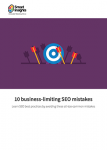Don't fall foul of these common but expensive SEO mistakes
Google’s engineers have said there are at least 200 ‘ranking signals’ which affect whether you can rank above your competitors or not. To make SEO even more challenging, many of them change frequently in Google’s algorithm updates.
So, it can be really tough knowing what matters in SEO and what doesn’t. To help give you focus, here we show some really common mistakes we have seen again and again as we have worked on SEO consulting and training projects.
We think SEO isn’t just for SEO specialists, all ‘hands-on’ marketers need to understand the main factors so they can ask the tough questions of SEO specialists and agencies. Here we're giving you five of the top 10 most costly SEO mistakes. If you're interested to discover more common SEO mistakes you can sign up for free to download the guide to the top 10 SEO mistakes.
1. Insufficient keyword research and analysis
We believe that understanding the search terms your audience is using to search for your products and services in Google is FAR too important to be left to an agency. We have seen many cases where target keyword lists are incomplete and un-categorised around consumer search behaviour. For example, one financial services client we were working with recently on an SEO project had just 10 keywords they were reporting on. Yet, there are many, many different types of potential search terms, they simply weren’t targeting the terms their competitors were – so they were missing out on visits and sales.
Marketing teams should have a solid understanding of the keywords and search terms used by their prospects, based around a gap analysis – a quantitative estimate of consumer search behaviours. This data can be used to inform keyword strategy and guide content development to ensure that the content being produced is relevant to the target audience.
2. Limited measurement and tracking of organic search
Organic search is a key driver of website traffic for many sites and yet this is not always measured or tracked effectively. Organic search is just one of many different channels, each of which should be assessed against higher level objectives, goals and KPIs.
The creation of a measurement framework will enable you to structure performance reporting so that organic search – and other channels – are measured against the broader goals you’re aiming to accomplish as a marketer. Clarity around SMART objectives linked to goals and KPIs will give you the ability to prioritise activity, identify tools (such as Google’s Search Console for granular data) and report on performance.
3. Failing to exploit the ever-evolving SERPs features
The features displayed on search engine results pages (SERPs) have changed dramatically over the last few years.
Features such as the Knowledge Graph, Quick Answers, Featured snippets and reviews mean that marketers must be know how to create the right types of content that search engines are looking to crawl, index and feature in their search results today.
A good awareness of the SERPs will help you to identify new content opportunities and what’s required in order to build visibility within organic search. Although some of these options will be technical (e.g. using Schema.org code to implement reviews), it’s always better to at least have an understanding of the opportunities so that you can start a conversation with an SEO specialist or developer as to how to exploit these new opportunities.
4. Lack of knowledge of the search engine ranking factors that REALLY matter
Despite the hundreds of different ranking factors Google uses to determine what is and isn’t featured within the SERPs, success is ultimately based on a handful of key on-site and off-site factors.
It’s important for teams to include content owner and editors who have a detailed working knowledge and understanding of the ‘rules’ of SEO and how they influence performance.
On-site ranking factors include having accurate page titles, headings and copy linking out to other websites, as well as the identification and removal of duplicate content.
Off-site factors include earning links from other relevant, quality sites in order to build your own website’s ‘authority’ around the subject you want to be known for.
5. Limited technical SEO knowledge or tools in place
Whilst advanced technical knowledge is not often realistic unless your marketing teams have a dedicated SEO resource, it’s still important to have an understanding of how search engine robots crawl and categorise a website’s content.
Google provides the Google Search Console (GSC, formerly Google Webmaster Tools) as a tool to help marketers minimise technical errors. While agencies should be responsible for this, in our experience, technical SEO is too important to rely on agencies alone, so someone should know the basics of using the Google Search Console.
If you want to find out more SEO mistakes that could be costly your business dearly, download our free guide to the top 10 SEO mistakes and how to avoid them.
source http://www.smartinsights.com/search-engine-optimisation-seo/10-costly-seo-mistakes/

No comments:
Post a Comment